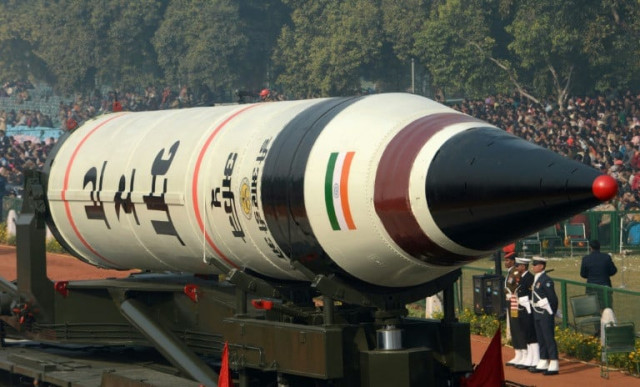Pakistan accuses India of violating accord with Agni-5 test
Advance notification was shared by India but it did not follow the 3-day timeline, says FO spokesperson

Islamabad on Thursday accused New Delhi of not fully complying with the agreement on advance notification of ballistic missile tests when India conducted its first successful test flight of a domestically developed missile capable of carrying multiple warheads.
As part of the agreement on pre-notification of the flight testing of ballistic missiles, Pakistan and India are bound to share advance notice for any testing.
Speaking at the weekly briefing, Foreign Office Spokesperson Mumtaz Zahra Baloch said Pakistan had taken note of the India missile test on the 11th March.
"The advance notification was shared by India but it did not follow the 3-day timeline as stipulated in Article 2 of the Agreement on Pre-notification of the Fight Testing of Ballistic Missiles," the spokesperson said while replying to a question.
"The agreement on pre-notification we believe must be complied with in letter and spirit," she stressed.
India successfully conducted its first test flight of a domestically developed missile that can carry multiple warheads, Prime Minister Narendra Modi said Monday.
The missile is equipped with Multiple Independently Targetable Re-entry Vehicle (MIRV) technology, Modi said in a post on X, formerly known as Twitter.
India has been developing its medium-range and long-range missile systems since the 1990s as its strategic competition with China grows.
Read also: India’s Agni-5 can carry multiple nuke warheads
In 2021, India successfully tested Agni-5, a nuclear-capable Inter-Continental Ballistic Missile (ICBM) with a range of 5,000 kilometres (3,125 miles) that is believed to be capable of targeting nearly all of China. Agni missiles are long-range surface-to-surface ballistic missiles.
India is also able to strike anywhere in neighbouring Pakistan, its arch rival with which it has fought three wars since they gained independence from British colonisers in 1947.
Meanwhile, the spokesperson expressed concerns over Indian government's move to implement the controversial Citizenship Amendment Act of 2019
"Yes, we have seen the reports on notification of certain news pursuant to the Indian Citizenship Amendment Act of 2019 and the ugly debate that is currently taking place in India with regards to Muslims, minorities and immigrants. Evidently, the legislation and relevant rules are discriminatory in nature as they differentiate amongst people on the basis of their faith," Mumtaz said.
She said the National Assembly of Pakistan in December 2019 passed a resolution criticising the law, where it termed it as against international norms of equality and non-discrimination and international human rights law.
"These regulations and laws are premised on a false assumption that minorities are being persecuted in Muslim countries of the region and the facade of India being a safe haven for minorities," she added.
"The rising wave of Hindutva under the BJP government has led to rapid political, economic and social victimisation of Muslims and other religious and social minorities, including Dalits," she said.
Read: India to enact divisive citizenship law
The spokesperson said the discriminatory steps further expose the sinister agenda of transforming India into a Hindu Rashtra.
"We believe that Indian authorities will be well advised to stop pre-choreographed targeting and systematic marginalisation of minorities inside India."
"Only a few days ago, a group of UN Special Rapporteurs urged corrective actions to protect human rights and attacks against minorities in the run-up to India's national elections. In the same vein, you may have seen the statement made by the UN High Commissioner for Human Rights in which he has termed this Act and the regulations as fundamentally discriminatory in nature and in breach of international obligations of India."
With that, she said Pakistan urged India to take action to protect its own minorities, especially Muslims, who are in a very difficult situation, because of the rising Hindutva in India and the threat that it poses to Indian society and to the region at large.
To another question, the spokesperson said Pakistan was aware of the upcoming hearing of the US subcommittee on Pakistan elections.
"Pakistan values its close relationship with the United States and believes in constructive engagement on all matters. And we respect the prerogative of legislative bodies to discuss and debate international issues," she said.
"We sincerely hope that their deliberations contribute to promoting positive dynamics in bilateral ties based on mutual respect and understanding. We therefore hope that the US Congress will continue its supportive role in strengthening Pakistan-US ties and developing avenues of mutually beneficial cooperation," the spokesperson said.



















COMMENTS
Comments are moderated and generally will be posted if they are on-topic and not abusive.
For more information, please see our Comments FAQ